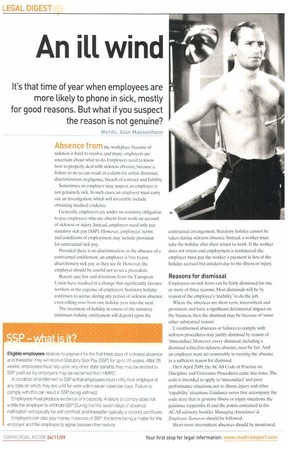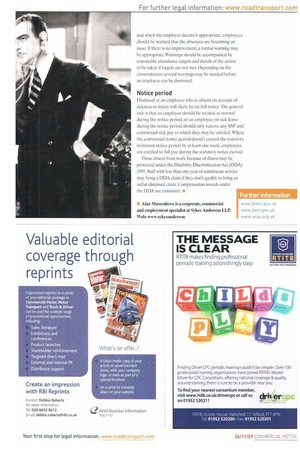An ILL wind
Page 26

Page 27

If you've noticed an error in this article please click here to report it so we can fix it.
Its that time of year when employees are more likely to phone in sick, mostly for good reasons. But what if you suspect the reason is not genuine?
Words: Alan Massenhove Absence from the workplace because of sickness is hard to resolve, and many employers are uncertain about what to do. Employers need to know how to properly deal with sickness absence, because a failure to do so can result in a claim for unfair dismissal, discrimination, negligence, breach of contract and liability.
Sometimes, an employer may suspect an employee is not genuinely sick. In such cases, an employer must carry out an investigation, which will invariably include obtaining medical evidence.
Generally, employers are under no statutory obligation to pay employees who arc absent from work on account of sickness or injury. Instead, employers need only pay statutory sick pay (SSP). However, employees terms and conditions of employment may include provision for contractual sick pay.
Provided there is no discrimination, in the absence of a contractual entitlement, an employer is free to pay discretionary sick pay as they see fit. However, the employer should be careful not to set a precedent.
Recent case law and directions from the European Union have resulted in a change that significantly favours workers at the expense of employers Statutory holiday continues to accrue during any period of sickness absence, even rolling over from one holiday year into the next.
The treatment of holiday in excess of the statutory minimum holiday entitlement will depend upon the contractual arrangement. Statutory holiday cannot be taken during sickness absence. Instead, a worker must take the holiday after their return to work. If the worker does not return and employment is terminated, the employer must pay the worker a payment in lieu of the holiday accrued but untaken due to the illness or injury.
Reasons for dismissal
Employees on sick leave can be fairly dismissed for one or more of three reasons. Most dismissals will be by reason of the employee's 'inability' to do the job.
Where the absences are short term, intermittent and persistent, and have a significant detrimental impact on the business, then the dismissal may be because of 'some other substantial reason'.
Unauthorised absences or failures to comply with sickness procedures may justify dismissal by reason of 'misconduct: However, every dismissal, including a dismissal related to sickness absence, must be fair. And an employer must act reasonably in treating the absence as a sufficient reason for dismissal.
On 6 April 2009, the ACAS Code of Practice on Discipline and Grievance Procedures came into force.The code is intended to apply to misconduct' and poor performance situations, not to illness, injury and other 'capability' situations. Guidance notes that accompany the code state that in genuine illness or injury situations. the guidance (appendix 4) and the points contained in the ACAS advisory booklet Managing Attendance & Employee Turnover should he followed.
Short-term intermittent absences should be monitored, and when the employer deems it appropriate, employees should be warned that the absences are becoming an issue. If there is no improvement, a formal warning may be appropriate. Warnings should be accompanied by reasonable attendance targets and details of the action to be taken if targets are not met. Depending on the circumstances, several warnings may be needed before an employee can be dismissed.
Notice period Dismissal of an employee who is absent on account of sickness or injury will likely be on full notice. The general rule is that an employee should be treated as normal during the notice period, so an employee on sick leave during the notice period should only receive any SSP and contractual sick pay to which they may be entitled. Where the contractual notice period doesn't exceed the statutory minimum notice period by at least one week, employees are entitled to full pay during the statutory notice period.
Those absent from work because of illness may be protected under the Disability Discrimination Act (DDA) 1995. Staff with less than one year of continuous service may bring a DDA claim if they don't qualify to bring an unfair dismissal claim. Compensation awards under
the DDA are unlimited. Further information








































































































































